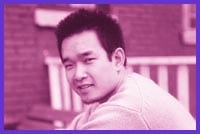Daniel Le immigrated to Canada from Laos at the age of seven. That was in 1985.
Now 22, he’s worked with the social and support group Gay Asians Toronto and, with his best friend, has set up Scented Boys (at http://scentedboys.tripod.ca) as a way to organize parties for young Asian guys. Doing things with other Asians is important to him.
“It’s fun meeting new people that are like yourself,” says Le. “I don’t have to explain to people why I eat rice or use chopsticks like I have to do this when I am around white and black people.”
Le, a graphic designer, is out in the community, but his parents don’t know he’s gay. He’s part of a younger generation of Asian gay men who are balancing their Asian identity with their gay one.
“Some young Asian youth want to assimilate so much into the gay community they want to feel accepted and deny being Asian,” says Peter Ho, gay men’s health coordinator at Asian Community AIDS Services (ACAS). Often “they were born in Canada and they feel they don’t need to use Asian services. However, when these young people go to the gay community they have TO deal with the racism and the fact they are identified first as Asian not as gay.”
In 1998, Ho and a volunteer conducted outreach sessions to Asian men in bars, bathhouses and clubs to find out what issues were on their minds. That led to a needs assessment based on the views of 20 Asians between 18 and 25.
Members of that focus group wanted a safe comfortable environment where they could socialize. They came up with the idea of the Bubble Tea Lounge, a free social evening meant to empower and support queer Asian youth and build leadership in the community. Some underwent one day of training to help mentor their peers who may still be struggling with their sexuality.
“The goal of the Bubble Tea Lounge is to accept people that are different for who they are,” says Ho. “The young people are the real stars.” Supporters have been so dedicated, Ho says, that last year, “one woman walked through the city of Toronto in the cold during winter and she posted flyers.”
Le’s dropped by the lounge with his friend, Steven Duong.
Duong, 25, is Chinese and was born on Prince Edward Island; his family moved to Toronto and he’s still not out to them (though he came out to others when he was 20). Duong says he likes the idea behind the lounge, especially the drag show, with performances by drag queens who sing traditional Chinese and Vietnamese songs.
“Since Asian gay people get to identify and see one another, people don’t feel so isolated,” Duong says. “The gay community is very white. It is not racist, but there should be more of an effort to reach young Asians and other people of colour.” He found out about the event through e-mail and says that websites and chat discussions might also be good ways to build community.
Masa Sato, 22, came from Japan to study and experience life in a Western country. His mother knows he’s gay, but she has sworn him to secrecy since his father wouldn’t approve.
“Japanese people are very homophobic,” Sato says. “They consider homosexuality to be bizarre. Japanese people do not understand why two people of the same sex can be attracted to one another.” Sato points to an incident in Japan last year when a young man was killed because he was gay but, as Masa says, “the Japanese media didn’t mention the sexual orientation of the young man, they just treated the murder as an accident.”
Before he came to Canada, Sato expected this country would be more open-minded about gay life. He was surprised that Canada is a multicultural society and there was a culture shock for him, since Japan is a more homogenous society. Generally he has found attitudes about homosexuality to be better here than back in Japan. But that openness doesn’t automatically make it easier to meet people.
“I don’t have a lot of friends in Canada,” he says. “I felt empty and I wanted to make friends.”
He first lived in New Brunswick, but after his roommate found out he was gay he treated him rudely. Sato transferred to the more cosmopolitan turf of York University to study linguistics. As an international student in the middle of the lengthy strike there, he found himself “lonely, isolated and depressed.” A trip to the 519 Church Street Community Centre directed him to the Bubble Tea Lounge.
“Toronto does not have a very large Japanese community and to even meet Japanese gay people is much harder,” says Sato. “It is easier for me to speak Japanese than English.”
Le, for his part, is doing his best to be friendly to his more isolated peers.
“I want to make people feel welcome but I don’t push them to come out,” he says.

 Why you can trust Xtra
Why you can trust Xtra


